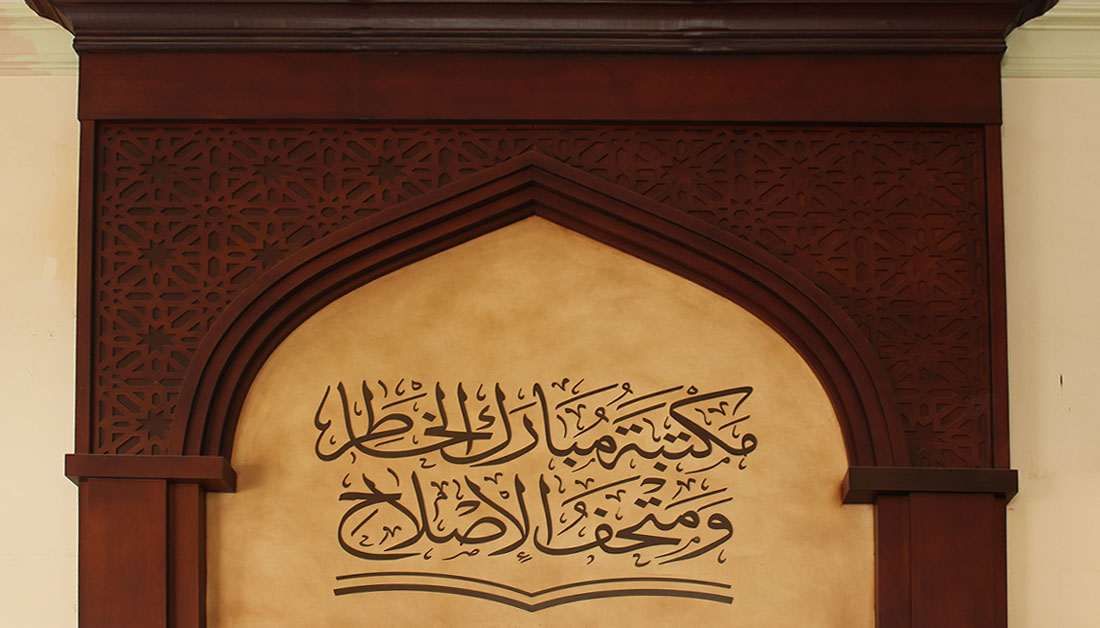
AlEslah Club and then AlEslah Society took care of the culture and building of an aware educated Muslim generation. The library and the cultural project since inception were as important as the other fields of work of the Society. With the development of modern media and communication means, interest in libraries has been decreasing in recent years and the role of libraries has eroded over the years. Therefore, the Society has determined to revive the important role of the library and the writers. As a result, it has established in its headquarters this distinguished cultural center under the name of Mubarak Al Khater Library and AlEslah Museum, inaugurated during the 75th anniversary of the AlEslah Society in December 2017.
The project seeks to be a cultural spot and an attractive center for reading, research and knowledge of the society's heritage, history and thought, as well as openness to constructive human thought to contribute to the development of the Kingdom of Bahrain and the service of its people. It also aspires to spread the moderate thought and create a cultural atmosphere that respects dialogue and introducing ideas.
It is also keen to create a vibrant cultural environment in an atmosphere of dialogue and acceptance of the other opinion, through which free thought can be put forward and moderate culture can be disseminated, providing a broad environment for holding seminars, lectures, panel discussions, exhibitions and various cultural activities.
Objectives:
1. Collecting and preserving the heritage of AlEslah Society, which is part of the history of the Kingdom of Bahrain, including historical books and documents, rare photographs and audio and visual materials.
2. Collecting Islamic heritage books, manuscripts, rare photographs, selected publications and documents to be a reference for researchers and interested parties.
3. Establishing a technically advanced library connected to databases and advanced research centers.
4. Preserving and maintaining the heritage of the late Professor Mubarak Al-Khater and his literary and historical production.
5. Creating a cultural atmosphere that encourages reading, research and holding cultural events that foster dialogue and enrich visitors’ intellectual aspect.
Library Sections:
The project includes about 3000 titles, including large numbers of parts and volumes of saome of these books. Books were distributed in the library in several sections as follows:
First: The Qur'an and its Sciences: It includes everything related to the Holy Quran and its sciences including its interpretation, sciences of Tajweed and readings in addition to confuting many of the misconceptions that challenge the Holy Quran.
Second: Creed and comparisons of religions
Third: Seerah and Islamic history
Fourth: The Hadith and its Sciences: It includes the books of Hadith, the science of Hadith terminology, study of narrators, validating and invalidating narrators, and others
Fifth: Jurisprudence, Principles and History of Legislation
Sixth: Women, Family and Children: It includes a number of books dealing with the characteristics of Muslim women and their role in Islam and comparative studies between women in Islam and other doctrines in addition to fatwas related to women. It also includes books on sociology, family jurisprudence and the raising of children and a lot of writings in the field of children's literature.
Seventh: Rare and gifted books: books of heritage existing in the Society since the beginning of the library in AlEslah Khalifi Club in the 1940s, as well as books gifted by persons, entities or institutions inside and outside Bahrain.
Eighth: Da’wa: It includes books dealing with the origins of da’wa, its arts such as the art of public speaking, means of preparation of preachers and da’wa materials that can be presented to the public.
Ninth: Books of Islamic culture and thought.
Tenth: General culture.
Eleventh: Medicine, related sciences and alternative medicine.
Twelfth: Islamic Society and Sociology.
Thirteenth: Books and writings by Mr. Mubarak Al-Khater.
Fourteenth: AlEslah Publications: This section collects the Society’s books, pamphlets, brochures, magazines, and others.
Fifteenth: History of Bahrain and the Arabian Gulf.
Sixteenth: Palestine, the Palestinian issue and everything related to the issue of Jerusalem and the Al-Aqsa Mosque from different aspects.
Seventeenth: Periodicals including magazines, publications of Bahraini, Arab and Islamic institutions.
Eighteenth: Arabic Language and Literature.
Nineteenth: Department of Education including the principles of education, educational curricula, how to formulate educational curricula, educational and school administration, teaching methods and methods of scientific research.
AlEslah Museum is attached to the library and it includes an archive containing all materials related to the history and heritage of the Society, minutes, reports, correspondence, rare photographs, films of the Society and Bahraini personalities who contributed to its events.
Those responsible for the project aspire to prepare an electronic library containing a huge storage capacity for the preservation of books, research, scientific theses besides audio and video aids contained in the library at the present time and those to be added in the future.
Why Mubarak Al Khater?
Mr. Mubarak bin Rashid Al Khater, one of the first members of AlEslah Society in Bahrain, has contributed to enriching the Society’s diverse activities since he was a young man until his death, may Allah have mercy on him. He offered the best of his thought to his religion, homeland and the nation through this society. The project was named after him in recognition of his contributions and as a kind of gratitude.
This project was a desire of Sheikh Issa bin Mohammed Al Khalifa for his companion. The project is a kind of loyalty to the two of them and recognition of the so much good they did for this Society and the nation.
